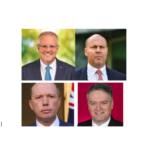Would You Want a Digital Driver Licence?

With two-thirds of Australians owning a smart phone and over a million ‘apps’ available online, technology is certainly playing an increasing part in our lives. And with your phone having the capacity to make online transactions and PayPass purchases in store, you hardly even need a wallet anymore.
But how would you feel about swapping your plastic licence for a digital one on your smartphone?
With the NSW election fast approaching, both major parties have come out with proposals to attract voters, one of which is Premier Mike Baird’s plan to switch from plastic to digital licences. Under the idea, people could choose to get their licences via a secure app rather than being given a card.
Each year, 2.8 million plastic licences are issued across NSW, and a switch to digital could save the government millions of dollars in administrative and production costs. The changes are expected to apply to photo ID cards, then boat and fishing licences as well as driver licences.
Under the proposed plan, digital licences would be optional, and people would still have the choice to retain a more traditional licence if they preferred. Other countries have proposed similar schemes, but NSW could soon be one of the first jurisdictions in the world to actually implement it.
Convenience is one of the big advantages of smartphones, and NSW Police Commissioner Andrew Scipione is also a strong supporter of the proposed move.
However the proposal is not without it’s problems. An app may be convenient, but what happens if your battery dies? Or if you travel interstate where the technology to read digital licences is not yet available?
Some have also raised concerns that the app would make it easier to create a fake driver licence. There are also significant privacy questions attached to the proposal, as hacking and identity theft are always a concern when information is stored electronically.
Putting the issue of hackers and identity thieves aside, would you be comfortable handing your phone over to a police officer so that he or she could check your licence? What if they wanted to take it back to their car?
Currently, police must have a good reason to search your phone without a warrant, but there’s little doubt that some unscrupulous police officers would leap at the opportunity to check through parts of your phone data when ostensibly conducting a licence check.
Such concerns have already been raised in parts of the US, where various suggestions have been made to prevent privacy breaches. One idea is to make an app that locks the rest of the phone while opened, allowing only the app to work. Another is to introduce portable readers so that an officer can scan the licence on your phone without having to touch it.
But hackers, identity thieves and unscrupulous police are not the only dangers. There are also concerns that the driver licence app might collect a range of personal data and make it available to government agencies.
Privacy concerns surrounding apps are nothing new and it’s no secret that many apps track and retain plenty of information about you, your interests, your communications and your movements – often without you even realising it. Many apps don’t even inform you of the information that will be harvested when you download them. And while most apps use the data they collect to function more effectively and deliver a better service, this does not necessarily protect you against misuse of information.
Some might say that if you have nothing incriminating on your phone, you would have no reason to worry about police or the government having a look. Of course, this implies that privacy is only for those with something to hide. But who would want their personal pictures, private text messages, passwords and other sensitive information accessed by strangers? And what about the potential dangers inherent in your personal information being available to dozens of government employees?
Such concerns have led Delaware Professor Chase Cotton to ask, “would you really want to put an app on your phone that the government wrote?”
Going to court for a traffic offence?
If you are going to court for a traffic offence, call or email Sydney Criminal Lawyers anytime to arrange a free first consultation with an experienced, specialist traffic lawyer who will accurately advise you of your options, the best way forward, and fight for the optimal outcome in your specific situation.






